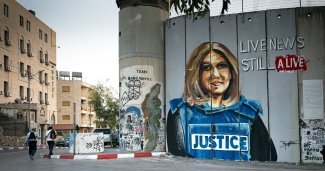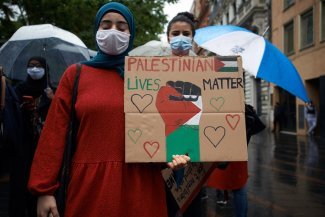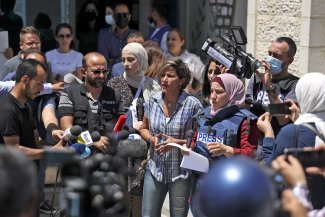Journalists, relatives and friends pray over the bodies of Palestinian journalists Sari Mansour and Hassouna Esleem after an Israeli airstrike hit their homes in the Bureij refugee camp in the central Gaza on 19 November 2023.
Gaza has become an abattoir for workers who bear witness.
Since Hamas’s attack on 7 October, in which 1,200 Israelis and foreign nationals perished and more than 200 were taken hostage, the coastal enclave has suffered unimaginably. At least 14,500 Gazans are dead – more lie under the rubble – 35,000 are injured and 1.7 million of its 2.3 million population are displaced.
Ironically, the immense suffering of the area’s media workers has mostly unfolded outside of the headlines. At least 49 journalists and media workers have been killed in Gaza. Another four Israeli journalists died on 7 October and three Lebanese journalists have also been slain. This brings the death toll (as of 23 November) to 56. It may be higher by the time you read this.
The fatality count has now reached around five percent of the 1,000 media workers that the International Federation of Journalists (IFJ) says work in Gaza.
To put it in context, three times more journalists have already died in the Strip than in the Ukraine war, in a fraction of the time, and the toll could soon surpass the 63 journalists killed over two decades of war in Vietnam.
The Committee for the Protection of Journalists says that the first month of the Israel-Gaza conflict was the deadliest for journalists since its records began, in 1992. Some 61 media offices have been bombed in Gaza, according to the Palestinian Journalists Syndicate (PJS). On average, a Palestinian media worker has died in every day of this war.
Yet there is “some concern” in the Biden administration that the newly-minted pause in fighting could have one “unintended consequence” for the press, according to a US official quoted in Politico, namely that: “It would allow journalists broader access to Gaza and the opportunity to further illuminate the devastation there and turn public opinion on Israel.”
Journalists bearing witness to the horrors of war can indeed sap the public appetite for more bloodshed but a counter-argument might be that this is why they are so vitally needed. Should the public not have access to more information on which to base future decisions?
Attacks on journalists are “premeditated”
Palestinian journalists say that Israel has pursued an unstated but deadly policy toward Gaza’s media workers. PJS vice-chair Tahseen al-Astal said: “We believe that the Israeli army is targeting Palestinian journalists, and that these attacks are premeditated. This is the impression that all Palestinians have right now.”
He was speaking to around 40 journalists the day before Israel’s invasion of the Gaza Strip, at a zoom meeting organised by the Brussels branch of the UK National Union of Journalists and the IFJ.
“The Israeli forces phone up journalists in Gaza and tell them that they and their families are going to be targeted for attack, and then the attacks come – purposefully aimed rockets and missiles deliberately intended to kill us,” al-Astal said.
Any such attacks would be war crimes but the elimination of witnesses by soldiers ignoring the rules of war, is not without precedent. Thirteen media workers were killed by US forces in Iraq, and 48 journalists who publicly opposed the Rwandan genocide were slaughtered in 1994.
In Lebanon, the killing of Al Mayadeen’s correspondent Farah Omar and camera operator Rabih Me’mari on 21 November came just days after the TV channel was shut down in Israel for what Israel’s government called its “wartime efforts to harm [Israel’s] security interests and to serve the enemy’s goals.”
The bombing of Al Jazeera bureau chief Wael al-Dahdou’s family on 25 October also followed a call just days before, for the channel to be banned by Israel’s communications minister, and a proposal to that end. Al Dahdou’s wife, two of his children and one grandchild all died in the Nuseirat refugee camp in Gaza’s south, where they had moved after a warning from the Israeli army to leave Gaza City.
“I don’t know how our colleagues are continuing to work in Gaza”
Shuruq As’ad, a PJS board member estimates that between 80-90 per cent of the dead media workers in Gaza were killed in their homes, adding heft to suspicions that journalists across the Strip are being routinely assassinated. One journalist, Ayat Khadoura, filmed her terrified last words as the bombing around her home in Beit Lahia intensified.
“Journalists are targeted,” As’ad told Equal Times on the phone from Jerusalem. “It’s not something that happens by coincidence. They [the Israeli army] don’t want the story to get out. They want to make journalists afraid. There is a really big fear now among journalists because there’s no protection. I don’t know how our colleagues are continuing to work in Gaza.”
Senior journalists there such as Salam Mema, the leader of the Women’s Journalist Committee in the Palestinian Media Assembly andBelal Jadallah, the founder of Gaza Press House and ‘godfather’ of Gazan journalism, have all been killed – Jadallah by a missile strike on his car, Mema by shelling of her house.
Some sense of déjà vu is inescapable. A study by a UK research agency and Palestinian human rights NGO last year found that the Palestinian-American journalist Shireen Abu Akleh was deliberately and repeatedly targeted by Israeli forces, who shot her dead in Jenin.
After months of denying any involvement, an Israeli army report finally found “a high possibility that Ms. Abu Akleh was accidentally hit by IDF gunfire.” A case has been filed at the International Criminal Court in The Hague, by the IFJ, the PJS, and the International Centre of Justice for Palestinians.
Numerous non-Jewish journalists working in Israel and the West Bank report incidents of official harassment since 7 October. One BBC Arabic team was dragged from their vehicle at gunpoint, assaulted and searched by police in Tel Aviv, even though their vehicle was clearly marked ‘TV’.
In one extraordinary tweet, Israel’s foreign ministry even accused AP, CNN, the New York Times and Reuters of having “journalists embedded with Hamas terrorists” on 7 October, based on claims by the HonestReporting lobby outfit, which were subsequently dropped.
Before they were, Danny Danon, Israel’s former ambassador to the UN and a current senior Likud member of Israel’s Knesset, accused the media workers of participating in the 7 October attack. “We will hunt them down together with the terrorists,” he tweeted.
An intolerable situation
Palestinian journalists have long suffered arrests, threats, attacks, travel bans and killings at the hands of Israeli forces. Reporters Sans Frontieres rated the Palestinian territories 156th out of 180 polities for press freedom in 2023, while Israel was in 97th place, even as its trade relations with the EU surged.
Since 7 October, 32 journalists in the West Bank have been arrested – mostly put into administrative detention without trial – because of their stories, or social media posts. The PJS says that almost 90 other media workers have been attacked by soldiers or settlers.
After beating one journalist in Jerusalem’s old city recently, As’ad said: “They took a photo of him and said they would circulate it among all the Jerusalem police and special forces and ‘if we see you again here you will not be arrested. They will put a bullet in your head.’”
This situation is intolerable and we have tolerated it for too long.
On 27 November, media workers and supporters will be taking our calls for an international inquiry into Israel’s treatment of Palestinian journalists onto the streets of Brussels with a candle-lit vigil outside the European Council building.
We will remember the Gazan journalists – most freelancers and photographers – who died trying to bear witness to Israel’s attacks. We will honour their bravery, craft and sacrifice.
And we will demand that the slaughter of Palestinian media workers – the suppression of living memory, in fact – be halted, and that those responsible for it be held accountable.
“It means a lot to see my colleagues standing up for my right to work freely as a journalist,” As’ad says. “It gives me hope that I have colleagues who are really ethical and maybe it will bring pressure to stop my colleagues being killed in the coming days.”
If the EU’s professed commitment to media freedom means anything at all, it must strain every sinew to pass on that pressure to Tel Aviv now.













